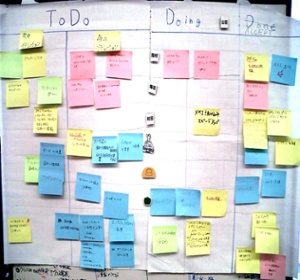 It’s been fascinating to co-deliver two Startup Weekends in a row.
It’s been fascinating to co-deliver two Startup Weekends in a row.
Watching more than 500 people pitch nearly 200 ideas, then create 60 prototypes has let us see some patterns emerging. We’ll keep adding to this post to share what we’re learning.
Meanwhile, you might want to also check these wise words from Brendan McCorkle at CloudMine.
Startup Weekends are 54-hour events where developers, designers, marketers product managers and startup enthusiasts come together to share ideas, form teams, build products and launch startups. On average, half of Startup Weekend’s attendees have technical backgrounds, the other half have business backgrounds.
Beginning with open mic pitches on Friday, attendees bring their best ideas and inspire others to join their team. Over Saturday and Sunday teams focus on customer development, validating their ideas, practicing Lean Startup Methodologies and building a minimal viable product. On Sunday evening teams demo their prototypes and receive valuable feedback from a panel of experts.
Before the Startup Weekend
If this is your first time to a Startup Weekend it could help to think about ideas, read twitter coverage and watch the many videos on YouTube of previous events. Don’t be afraid to contact anyone you see tweeting or blogging about Startup Weekends if there’s a question you want to ask! The whole point is that everyone goes through a very similar experience of sharing and intense learning and anyone who’s writing about a Startup Weekend where they participated is sure to want to connect with others.
Coming up with an idea
Even if you have been to a Startup Weekend before, it’s good to start thinking about ideas in advance, if you think you might want to present one. The most reliable guide to tech startups is to scratch your own itch. Solve some problem that’s been bothering you, and if you’re plugged in to the zeitgeist it’s probably been bothering lots of other people too. It’s OK to replicate something that’s been done before, particularly if you’re bringing it to a new part of the world or doing it in a different way, but to avoid being seen as simply doing a ‘me too‘ product you need to make clear why you’re replicating something in your final presentation on the Sunday. Finding the prior art isn’t difficult. Often all it takes is a few seconds on Google trying different phrases that might describe your idea to check what’s out there. In the last two weeks we have seen at least four ideas pitched more than once … and in every case a quick check on Google would have revealed that.
Arriving on the Friday Night
The focus of startup weekend is officially ‘all action, no talk’. Actually that’s an over-simplification. There are few or no official presentations, but you do talk — with one another. The people you meet at a Startup Weekend could turn out to be business co-founders, employers or even soulmates. There’s a big social dimension to it and most people turning up will know only a few folk in the room, if any. So use the time from the moment the event opens to open conversations with people: it doesn’t have to be hard-core networking, just making connection. Some people don’t find that comes easy, Wikihow has somesuggestions for ways to get started. You already have something in common with everyone at SW: you’re all used to making things, not just talking about things; you’re iinterested in technology and creating valuable new designs.
The introduction
All Startup Weekends begin with some kind of introduction from the host. The details like prizes, judging criteria or theme might vary but generally speaking this will be the format:
- Friday – ideas pitching, forming teams
- Saturday – coding
- Sunday – coding / prepare for demonstrations
- Sunday evening – demonstrations
The ideas pitching session
Not everyone who comes to the weekend will have an idea to pitch. Hopefully. Or you’ll be there all night, even when most Startup Weekends restrict the time per pitch to one minute.
 Some people worry about their idea getting ‘ripped off’ if they disclose it in public. Lawyers might argue differently (because they’re paid to) but our practical experience is that if an idea can be ripped off from a one minute pitch then:
Some people worry about their idea getting ‘ripped off’ if they disclose it in public. Lawyers might argue differently (because they’re paid to) but our practical experience is that if an idea can be ripped off from a one minute pitch then:
a) the different versions will be executed very differently by different teams;
b) the idea probably wasn’t very valuable anyway because it didn’t have much in the way of secret sauce.
If you do decide to pitch, it will help everyone if you use something like the format promoted by Adeo Ressi of The Founder Institute. Our version of his formula is below.
Complete these blanks:
My Startup __________ Company Name (it can just be a one or two word ‘handle’ for now – choose something memorable and descriptive)
Is developing __________ Specific application or platform (eg ‘A web application’ or ‘a mobile app’ or ‘an app for smart TVs’)
To help __________ Some target customers (make it a vivid, specific description that conjours up a picture in everyone’s imagination. Try to pick a market that is broad enough for your business to scale and yet specific enough to be meaningful. Try to help the audience see the face of your customer.)
To __________ Solve a problem or provide a benefit (eg ‘meet new friends’, ‘sell spare eggs’, or ‘eliminate wasted time at work’. Don’t describe features and functions: think what is the benefit the product will provide in use. Outline its content and context.)
The world is ready for this innovation because __________ Some emerging trend (eg ‘Online trading has made people comfortable doing business with strangers’, or ‘family size is decreasing’, or ‘goats are no longer prepared to replace the batteries in their videogames as frequently’.)
The right team I need to do this is __________ briefly describe your dream team (e.g. ‘Me the ideas person plus two developers and a designer. We need several people with direct personal experience of the issue this product resolves’. Passion and conviction are a good start. But it helps hugely to have people with insight, relevant skills and the ability to execute.)
We will make money by __________ Some idea of the monetisation model (e.g. Selling Ads, a monthly subscription, charging a transaction fee. It helps to think very specifically about who derives value from your service, which might be different from the people who pay for it. Don’t get hung up on this if you can’t think immediately.)
Our startup differs from competitors because _________ Describe your secret sauce (Try to find something that could become asustainable competitive advantage. Things like being passionate, creative and committed are wholesome but everyone thinks they are at least one of those! What actual differentiation can you show?)
When you are done, you should end up with a pitch that is less than 150 words long that will fit comfortably into one minute of speaking. Rehearse it by trying it out on a few strangers. Learn it so you don’t need to read it. Then you can watch the eyes of your victim as you test it out. If it’s weak, you will see them look bored or confused and the moment when you lost them will have been about ten seconds before that expression appeared on their face.
When you’re comfortable with your pitch, write it on a piece of paper that’s distinctive somehow (maybe it’s a strange colour, has the title written in goofy letters, or whatever). Hold the paper in front of you as you pitch to the audience so that they associate that piece of paper with you and can vote for it. Include your phone number on the bottom of the paper so that people can contact you even if they can’t find you when you come to …
 Forming teams
Forming teams
Your Startup Weekend might use some fancy online tool to match people up into teams. But probably not. Chances are the paper ideas will be taken from everyone who pitches and stuck up on the wall. Everyone will then get a few minutes to stick stickers on their favourite ideas or in some other way indicate which they most like. This is where something distinctive about your piece of paper can help people to remember that it’s the idea they really liked in amongst the tens of others that they will just have heard.
As a team forms, you need a balance of skills. Perfect would be a developer or two, someone who’s good at design or user experience and someone commercial. Maybe you have a subject matter expert too. For example, if you are working on a healthcare app, having a doctor on the team would be a massive bonus, even if they can’t code, don’t have a clue about design or making money. Likewise if you are pitching something to do with travel, make sure someone on the team actually has experience of working in that industry to keep what you do real.
A good team size would be 4-6. Above that it tends to get time-consuming for everyone to get to know each other and for everyone to have their say.
Closing Friday night
Aim to end the Friday night with a team formed and some kind of shared vision about where you are all aiming to be by Sunday night. For example: do you have the resources and skills to hand to create a working Minimum Viable Product (MVP)? Or are you going to have to get by with a visualization because you don’t have real developers available? Try to aim for an MVP if you can because it will feel much more of an achievement, give everyone a sense that your project is real and the discipline it will impose on stripping out the bells and whistles to focus on the core of the idea can be incredibly helpful.
As you plan the weekend together, resist any moves that look like turning it into a theoretical exercise. Startup Weekends are not business plan competitions. Nobody expects you to put forward and MBA style investment plan and, if you try to do so, you won’t have any time to demonstrate what you’ve built. Remember, this is about all action, no talk – do, then show what you’ve done. That’s the objective.
My idea didn’t attract a team!
Don’t be upset if your idea doesn’t get much support. It doesn’t mean it’s hopeless. It may be that the folk you need to realize it aren’t in this room at this particular time, or that you need to work on the way you tell the story around the idea so that its brilliance shines more clearly next time.
You might be tempted to go ahead with your idea alone, or maybe with one other person. Try to resist that temptation because you are unlikely to have the resources required to create something complete by the end of the weekend. Instead, try to join another team and make the friends and connections you need to try your idea independently, or at the next Startup Weekend in your area.
Saturday
For anyone not in a team, Saturday can be boring to watch. People sit around, get wildly excited then become despondent as the clarity they thought they had reached goes out of focus. This is normal. It can help to go back to the original idea pitch and check whether any elements of it need to change – but try to shrink down the number of words, rather than adding to them. That way you will achieve clarity.
 Managing Tasks
Managing Tasks
If you haven’t done it on Friday night, first thing on Saturday morning make sure you work backwards from what you think you can demonstrate on Sunday to define what needs to be achieved.
Break the demonstration down into tasks and write each one on a card or post-it note, assigning it to someone in the team, or roping in someone external to do it for you.
Create a Kanban system that will see the task cards move from a left hand ‘To Do’ column, through ‘Doing’ or ‘In Progress’ to ‘Done’.
If you want to go all-electronic then Trello offers a free service that will do this for you online.
Just Focus and Do It
If your team is having a hard time focusing on what is important or feels like it’s losing the plot, ask if there are any mentors around. Keep watching the twitter hashtag for the event, shouting out progress and asking for whatever specific help you need. It is common for very senior community members to monitor the twitter hashtag for Startup Weekends and you may find amazing people that you would otherwise never meet coming in specially to help on the spur of the moment.
 If your team is getting bogged down in trying to evaluate options, try setting a time limit, like one minute, to make critical decisions. Then agree that you will all abide by whatever was decided. You will meet countless crossroads with no signposts through Saturday and it may not matter that much which way you turn, so long as you keep moving.
If your team is getting bogged down in trying to evaluate options, try setting a time limit, like one minute, to make critical decisions. Then agree that you will all abide by whatever was decided. You will meet countless crossroads with no signposts through Saturday and it may not matter that much which way you turn, so long as you keep moving.
Sunday
By Sunday morning you will all be exhausted and you may find that the all action, no talk motto literally comes true as the team turn into zombies. It can help for whoever is going to lead the pitch to make sure they get some rest. By lunchtime on Sunday you should have a clear vision of what you are going to demo and the tension starts building as you realize that the hours are ticking by to …
The Demo
It’s called a Demo, not a presentation, for a good reason. The idea is to make a brief introduction then show what you’ve done. You will probably only get four or five minutes and no Q&A. The best format to use is to start with a re-worked version of the original pitch, in one minute or less, then proceed to show what you’ve done. Don’t try to talk about bogus market research or financial projections because everyone will know you haven’t had time to do this properly over the weekend.
Good luck!

